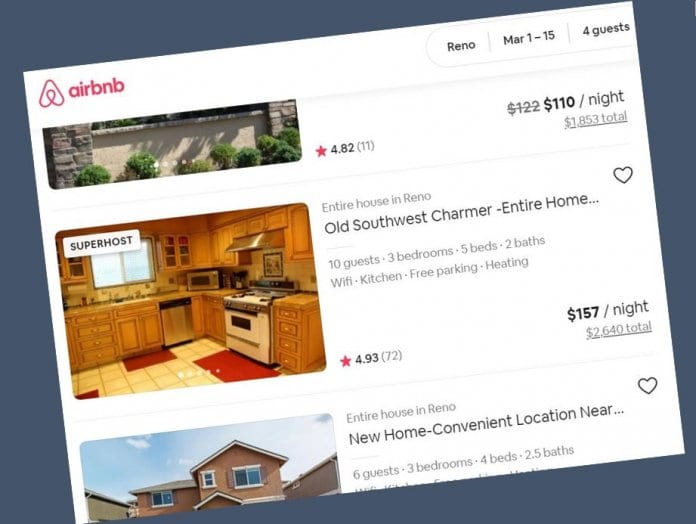Affordable housing problem “couldn’t get worse” says commissioner
By Dana Gentry, Nevada Current
This story was originally published by Nevada Current
Washoe County Commissioners are poised Tuesday to officially open the door to what critics call “the ‘hotel-ification’ of entire neighborhoods.”
A proposed ordinance to regulate short-term vacation rentals (STRs) in residential neighborhoods in unincorporated areas of Washoe County is expected to generate both support and opposition.
Proponents say room sharing allows financially strained homeowners to generate a little income. But critics contend the notion of residents renting out a room here and there is far from the reality of the prolific industry they say is compromising the quality of life in their neighborhoods.
“Armies of transients jamming into overflowing houses and condos, fleets of cars blocking streets and filling lots, loud all-night parties with disorderly drunks and mounds of trash strewn around the community’s trails, beaches, and neighborhoods,” is what Washoe County has in store, Incline Village resident Pamela Tsigdinos wrote in an opinion piece in the Reno Gazette Journal. “Combine unlimited short-term rentals with wildfire season or a pandemic and you compound multiple, dangerous public safety and health crises.”
Tsigdinos and other opponents complain the proposed ordinance makes it possible for every home in Washoe County to become a short-term rental.
“As more and more short-term rentals are created (operated by non-voting absentee owners appear in residential neighborhoods), full-time residents will move out of the community,” she wrote. “Washoe County will be left with absentee short-term rental properties and owners who have no allegiance to — nor interest in — the welfare of the community or the future of the county.”
Tsigdinos says limited liability corporations and real estate investment trusts are buying up properties to convert to STRs, exacerbating Northern Nevada’s affordable housing shortage.

“I don’t think it could get worse,” says newly elected Washoe County Commissioner Alexis Hill, who advocated for “common sense regulations” for short-term rentals during her campaign. “This has been a difficult process and very emotional.”
“I’m going to deliberate on the dais in a public forum. I don’t want to say how I’m going to vote,” Hill says, adding she’s keeping an open mind about the proposed ordinance but says it “would be positive to get something on the books to figure out where we’re at.”
Hill admits the proposed ordinance lacks the prohibitions opponents clamor for, but she says stricter regulation down the road will require data to back it up.
The only data available was purchased by Washoe County from Host Compliance, a company contracted by the county to gather information about STRs operating on Airbnb, VRBO and other platforms.
Washoe County officials initially agreed, but later declined to turn it over to the Current, citing NRS 230.014, which says a government can withhold public records if it “determines that the disclosure of the personally identifiable information could potentially create negative consequences, including, without limitation, financial loss, stigmatization, harm to reputation, anxiety, embarrassment, fear or other physical or emotional harm, for the person to whom the information pertains.”
“The Host Compliance report includes homeowner information, and we cannot release that info until we get legal clearance to do so,” Washoe County spokeswoman Bethany Drysdale told the Current. “Publicly disclosing their info could put them at risk for retaliation. Once we get legal clearance and start issuing permits, we can share the general location of the STRs.”
Hill says the data purchased by the County from Host Compliance is “not the data we would need to look at future regulations.”
The county did not say how much it paid for the information.
Tsigdinos concedes the Commission is likely to pass the ordinance, which does nothing to restrict STRs.
“We need to cap the total number of short-term rentals in our neighborhoods. We need transparency on short-term rental operators, strict fines, and dedicated code enforcement to eliminate bad actors.”
She also wants STR ownership in residential zones limited to “voting residents.”
But striking the right balance on property rights restrictions — imposing too few or too many, could be problematic, says Hill.
“You can get yourself in some legal trouble either way,” she said. “It’s very difficult to go very strict up front without the data.”
She says other communities have also started with broad regulation and added more stringent rules.
“I would argue we are starting small and going to expand,” she said.
“The obvious driver for these regulations has been commercial interests,” Incline Village resident Judith Miller wrote in an op ed for the Tahoe Daily Tribune. “Commissioners reduced permit fees for rentals with a licensed property manager, but no reduction for a homeowner who is only renting out a part of their home and is onsite to monitor activities.”
Hill said that proposal has yet to be discussed by commissioners. Her colleagues on the Commission did not respond to requests for comment.
Residents also complain their community is generating tax revenue that doesn’t return a benefit.
“Sadly, most of the transient lodging tax that comes from our community does not stay in our community,” Miller wrote. “The small portion that does stay here is used to promote more tourism — just what we need.”


